- Home
- Shelby Foote
The Civil War: A Narrative: Volume 2: Fredericksburg to Meridian Page 15
The Civil War: A Narrative: Volume 2: Fredericksburg to Meridian Read online
Page 15
So they thought; but they were wrong, at least so far as the schedule was concerned. Though there were tentative skirmishes, fitful exchanges of artillery fire, and some readjustment of the tactical dispositions on both sides, New Year’s Day saw nothing like the carnival of death that had been staged on New Year’s Eve. In point of fact, the two armies were rather like two great jungle cats who, having fought to mutual exhaustion, were content—aside, that is, from the more or less secret hope on the part of each that the other would slink away—to eye one another balefully, limiting their actions to licking their wounds and emitting only occasional growls and rumbles, while storing up strength to resume the mortal contest.
Considerably surprised, in the light of last night’s cavalry reports of a withdrawal, to find the enemy not only still there, but still there in line of battle, Bragg sent Polk forward about midmorning to discover what effect a prod would have. He soon found out. Though the troops moved unopposed into the Round Forest, which Rosecrans had ordered evacuated so as to straighten out his line, and which in turn gave validity to the bishop’s subsequent claim that “the opening of the new year found us masters of the field,” Polk encountered resistance just beyond it too stiff to permit his men to emerge from the woods on the far side. All he had gained for his pains were more blue corpses, along with the unwelcome task of digging their graves in order to rid his nostrils of their stench. Likewise, on the Union left, Rosecrans advanced Van Cleve’s division—now under Colonel Samuel Beatty; Van Cleve had caught a bullet in the leg—beyond Stones River, retracing the route it had taken the previous morning by moving today into the vacuum created by the withdrawal of Breckinridge the afternoon before, and occupied a hill overlooking the ford. These were the only major readadjustments, North or South, though the Federals were reinforced by a brigade arrived from Nashville, accompanied as one officer said by “an army of stragglers” picked up along the pike. For the most part, the soldiers on both sides roved the field, looking for fallen comrades among the wounded and the slain. The search for food was even more intensive, and for once, as a result of Wheeler’s depredations in the course of his prebattle ride around the Union forces, the Yankees were worse off in this respect than the rebels. One brigade commander later recorded that he made his supper off a piece of raw pork and a few crackers he found in his pocket. No food had ever tasted sweeter, he declared. Even so high-ranking an officer as Crittenden was not exempt from want, but as he went to bed, complaining of hunger pangs, he was delighted to hear his orderly say he could get him “a first-rate beefsteak.” The Kentuckian accepted the offer gladly, and presently, when the promised meal was brought, consumed it with gusto—only to learn next morning that the “beefsteak” had been cut from a horse that had been killed in the battle. “I didn’t know this at the time I ate it,” he afterwards explained, somewhat ruefully.
Day ended; night came down. Although Rosecrans had no apparent notion of resuming the offensive, or indeed any definite plan at all beyond holding onto the ground he had fallen back to, he was pleased to have had this day-long opportunity to consolidate his forces and recover in some measure from the shock to his army and his nervous system. Bragg on the other hand seemed to have no more of a plan than his opponent. Convinced that he had won a victory, he apparently did not know what to do with it beyond setting various details to work collecting the arms and matériel scattered about the field and paroling the thousands of captives he had taken the day before. What he mainly wanted, still, was for the enemy to admit defeat by retreating, and thus substantiate his claim; then he would follow, as he had promised in his wire to Richmond, hoping to catch the blue mass in motion on the pike and tear its flanks and rear, which now were inaccessible to him beyond the guns parked hub to hub behind the long lines of close-spaced bayonets weaving in and out of the cedar brakes and among the gray outcroppings of rock that scarred the landscape. The prospect was altogether grim. After nightfall, however, he was again encouraged by cavalry reports that well-guarded Federal trains were in motion on the roads leading back to Nashville. If this meant what Bragg hoped it did, that the Unionists were finally admitting they were whipped and were preparing to retire, bag and baggage, he would be up and after them tomorrow.
Tomorrow’s dawn showed the prospect unimproved. Whatever might be moving along the rearward roads, the bayonets defining the Union front glinted quite as close-spaced as ever and the guns frowned every bit as grim. In fact, as Bragg conducted a personal inspection of his lines that morning, combining with it a long-range binocular reconnaissance of the enemy position, he began to perceive that, despite his bloodless occupation of the Round Forest, which increased his claim to the honors of the field, it was his own army which was in the graver danger as a result of yesterday’s tactical readjustments. The advance of Van Cleve’s division, which put it in possession of the hill just east of the river, gave him particular concern. Artillery emplaced on that height could fire across the stream and enfilade Polk’s flank if he attempted to advance. With this in mind, Bragg decided the enemy guns must be dislodged. Accordingly he sent for Breckinridge, whose troops had returned to their east-bank position north of Murfreesboro, along a ridge about a mile short of the hill overlooking the ford. When the former Vice President reached army headquarters, under a large sycamore that stood alongside the Nashville pike just west of the wrecked bridge that had spanned Stones River, Bragg told him what he wanted. He was going to resume the offensive by sending Polk forward, he explained. First, though, he wanted Van Cleve’s men flung off the dominant height. This was admittedly a tough assignment, he continued, but to protect the attackers from the added strain of having to repulse a counterattack, he was directing that the movement be made less than an hour before sundown, which would give the Federals no time to reorganize or bring up reinforcements before dark. Then next morning Polk could jump off, not only with his flank secure, but also with the enemy mouse-trapped out of position to his front.
Breckinridge, who was not yet forty-two despite his distinguished prewar career in national politics—a hearty-looking man with a prominent forehead, somewhat bulging eyes, a plump but firm jaw, and the swooping dark mustache of a Sicilian brigand, he was a leading contender among the many candidates for the title of the handsomest general in the southern army—protested at once and for all he was worth. The hill was well-nigh impregnable, he said, and Van Cleve’s division had now been reinforced by two brigades from Palmer; besides which, he added, guns from the main Union line across the river would tear his flank as he advanced, thus exposing his men to the very horror he would be sparing Polk’s if he was successful, which was doubtful. Warming to the subject, he took up a stick and began to draw in the soft dirt a map that emphasized the difficulty of the terrain. Bragg stopped him in mid-sketch. The Kentuckian had delayed the battle two days ago with similar protests which had turned out to be ill-founded, and the army commander was having no more of that. “Sir,” Bragg said curtly, “my information is different. I have given the order to attack the enemy in your front and expect it to be obeyed.”
That was that, and Breckinridge returned to his troops, most of whom were Bluegrass natives like himself, exiles from their homeland since midwinter nearly a year ago; “my poor orphans,” he sometimes called them, jokingly but not without an undertone of sadness and homesickness. Rejoining them he sought out his friend Brigadier General William Preston—now commanding one of his brigades, but formerly chief of staff to his brother-in-law Albert Sidney Johnston, who had died in his arms at Shiloh—to whom he now addressed himself concerning the assignment he had just been given. “General Preston,” he said, speaking formally and with a tone that strangely combined dejection and determination, “this attack is made against my judgment and by the special orders of General Bragg. Of course we all must try to do our duty and fight the best we can. But if it should result in disaster and I be among the slain, I want you to do justice to my memory and tell the people that I believed this attack to b
e very unwise and tried to prevent it.” And having thus unburdened his mind he ordered his five brigades to form for the assault.
Across the way, Crittenden was inspecting his dispositions along the west bank of Stones River, accompanied by his chief of artillery Captain John Mendenhall, when he looked over the ford near the base of the occupied hill beyond and saw the graybacks forming in heavy columns along the ridge to the south, obviously preparing for a blow at Beatty, who commanded not only Van Cleve’s division but also the two brigades of reinforcements which had joined him that morning. It was now about 3.30; the sun was within an hour of the landline. According to Mendenhall, “The general asked me if I could not do something to relieve Colonel Beatty with my guns.” The Indiana-born West Pointer could indeed, and he moved to do so promptly. Assembling within the next half hour a total of 58 pieces of various calibers, he stationed 37 of these on the crest of a west-bank hill, cradled by a bend of the stream and overlooking the opposite bank, and placed the other 21 along its eastern base for flat-trajectory fire that would catch the rebel columns end-on as they charged across the rolling slopes beyond the river. Then he waited; but not for long.
The five Confederate brigades, with a total effective strength of 4500 men, started down off their sheltering ridge at 4 o’clock, moving steadily across the valley which lay between them and the hill from whose crest Beatty’s cannoneers and riflemen soon took them under fire. As at Baton Rouge five months ago, where they had fought in isolation while the rest of Bragg’s army was preparing to set out for their native Bluegrass, the Kentuckians did not falter as they swung down the long slope of the intervening valley, crossed its floor, and began to climb the other side. Halfway up the face of the hill, taking heavier losses now at closer range, they fired their first volleys and then, beginning to yell, broke into a run for the crest. The bluecoats did not wait for them, but whirled and fled from the threat of contact, and the attackers came on after them, yelling now with shrill screams of triumph as they topped the rise and pursued the defenders down the rearward slope. However, they could not close the gap created by the quick retreat, and this gave Mendenhall the chance he had been waiting for all this time, to shoot at his foes without injuring his friends. At the signal “Fire!” his 58 double-shotted guns began to roar in chorus, flinging more than a hundred rounds a minute against the flank of the butternut mass across the way. “Thinned, reeling, broken under that terrible hail”—thus one reporter described the instantaneous effect—the graybacks milled in confusion, scarcely knowing at first what had struck them. When they saw what it was, they attempted to change front to the left and move against the fuming hill beyond the ford; but to no avail. “The very forest seemed to fall before our fire,” one Federal observer wrote—without exaggeration, for men in the gray ranks were actually crushed under fallen limbs that were torn from the trees by exploding shells when they tried to find shelter in a patch of woods—“and not a Confederate reached the river.” Shattered, they changed front again to the left, of one accord, and ran for the ridge that had marked their line of departure. A Union colonel, watching this sudden turn of events, was the amused witness of a double, simultaneous retreat. “It was difficult to say which was running away the more rapidly,” he later reported, “the division of Van Cleve to the rear, or the enemy in the opposite direction.”
Breckinridge watched his men come stumbling back through the dusk that followed sunset of the brief winter day. They had been gone just seventy minutes in all, and of their number 1700 had fallen: which meant that better than one man out of every three who descended the slope did not return unhurt. As their commander, who had protested the slaughter in advance and done what he could to prevent it, watched them close ranks to fill the gaps as they formed their line behind their own ten guns on the ridge, his eyes filled with tears. “My poor orphans! My poor orphans!” he exclaimed.
The lament for the fallen need not have been limited to the Confederate right, nor indeed to either side of the line of battle; for the overall Federal losses had been even heavier. According to final reports and computations, in two days of conflict—the day-long struggle of the 31st and the sunset repulse on the 2d—only a dozen less than 25,000 casualties had been suffered by the two armies. (Which, incidentally, indicated something of the fury of western fighting. With fewer than half as many troops involved, the butcher bill at Murfreesboro, Tennessee, was more than one-third greater than the one presented at Fredericksburg, Virginia, three weeks back.) The South lost 1294 killed, 7945 wounded, and 2500 captured or missing, a total of 11,739. The North lost 1730 killed, 7802 wounded, and 3717 captured or missing, a total of 13,249. The over-all total thus was 24,988: which was to say, and more could scarcely be said, that the battle had been bloodier than Shiloh or Sharpsburg.
At any rate, though neither commander yet recognized the fact, the carnage was over. Polk, who had learned of the sunset assault only just before it was launched, when Bragg came to his headquarters for a better view of the action across the river, had protested almost as vehemently as Breckinridge had done, but with no more success; Bragg’s mind was quite made up. And now that the attack had met with predicted disaster, the blue defenders returned to the abandoned hill in greater strength than ever, reinforced by another whole division. Tactically, all was as it had been before the assault was launched, only more so; Polk would be less able to advance tomorrow than he had been today. Whether the enemy was under a similar disadvantage he did not know, but his two division commanders were not only doubtful that such was the case, they were also doubtful that their troops were in any fit condition to block the way: as was shown by a letter they wrote, shortly after midnight, and sent through channels to Bragg. “We deem it our duty to say to you frankly,” Cheatham and Withers declared, “that, in our judgment, this army should be promptly put in retreat.… We do fear great disaster from the condition of things now existing, and think it should be averted if possible.” Polk added his endorsement to the unusual document: “I greatly fear the consequences of another engagement at this place in the ensuing day. We could now, perhaps, get off with some safety and some credit, if the affair is well managed,” and forwarded it to Bragg. Waked at 2 a.m., the grim-faced commander sat up in bed and read the letter halfway through, then stopped and told the aide who had disturbed his sleep: “Say to the general we shall maintain our position at every hazard.”
When he rose at daylight, however, he began to discover how great that hazard was. Rain was falling steadily and the river was rising fast, threatening to isolate the two wings of his army. Moreover, unlike the previous ones, this morning’s cavalry reports gave no hint of signs in the night that the enemy was considering withdrawal, but rather informed him that another fresh brigade of reinforcements had just arrived on the Union right, accompanying a train of supplies from the Tennessee capital. By now, too, his staff had found time to study the papers captured when McCook’s headquarters were overrun, which indicated an effective strength of nearly 70,000 bluecoats to his front. This gave Bragg pause, and having paused he wavered. At 10 o’clock that morning he sent for Polk and Hardee, who found him in a different frame of mind from the one he had shown eight hours ago, when he was roused out of sleep to read the letter advising retreat. With the enemy heavily reinforced, as he believed and later wrote in his report, “Common prudence and the safety of my army, upon which even the safety of our cause depended, left no doubt on my mind as to the necessity of my withdrawal from so unequal a contest.” The retrograde movement got under way that night, January 3, and was conducted with such skill that not even a rear-guard action was fought with the unsuspecting Federals, who seemed no more anxious to pursue than Bragg had been to stay. He himself went to Winchester, fifty miles southeast, planning to establish a new line along Elk River. Polk was instructed to fall back on Shelbyville, Hardee on Tullahoma, respectively twenty-three and thirty-five miles from Murfreesboro, but when the former reached his goal and reported that the bluecoats had not ven
tured beyond Stones River, Bragg ordered Hardee to stop at Wartrace, on line with Polk. Returning at once to establish headquarters at Tullahoma, on the railroad about midway between Nashville and Chattanooga, he began to organize a new defensive position along the Duck, whose rich valley offered much in the way of subsistence and adequate camp sites, including level fields for the daily hours of close-order drill in which he placed great store as a disciplinarian.

 Chickamauga and Other Civil War Stories
Chickamauga and Other Civil War Stories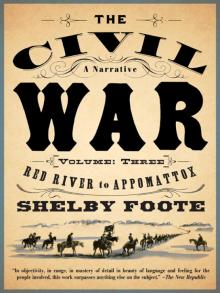 The Civil War: A Narrative: Volume 3: Red River to Appomattox
The Civil War: A Narrative: Volume 3: Red River to Appomattox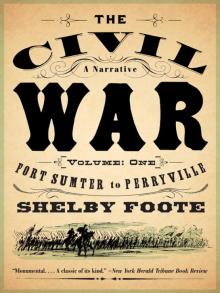 The Civil War: A Narrative: Volume 1: Fort Sumter to Perryville
The Civil War: A Narrative: Volume 1: Fort Sumter to Perryville Jordan County
Jordan County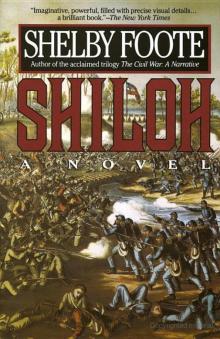 Shiloh
Shiloh Love in a Dry Season
Love in a Dry Season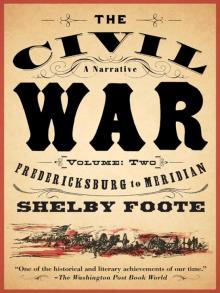 The Civil War: A Narrative: Volume 2: Fredericksburg to Meridian
The Civil War: A Narrative: Volume 2: Fredericksburg to Meridian Chickamauga
Chickamauga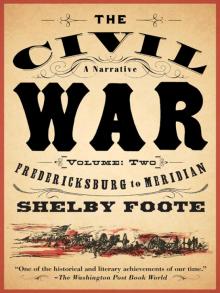 The Civil War: A Narrative: Fredericksburg to Meridian
The Civil War: A Narrative: Fredericksburg to Meridian